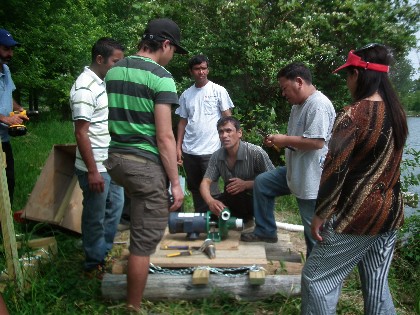By Cheryl Herrick
When farmers in the US need help, they tend to know that there are federal US Department of Agriculture (USDA) programs available to help them. But for new Americans, these resources may not be on their radar at all. And—especially when combined with the reality of learning a new language and a new culture—that can mean missing out on access to critically important tools for a successful, sustainable farm business.
Thanks to funding from the USDA Outreach and Assistance for Socially Disadvantaged and Veteran Farmers and Ranchers program, Ben Waterman of the UVM Extension Center for Sustainable Agriculture (CSA) was able to put together a team to address the need of access to services for new American farmers. They have just released a series of videos in different languages to give new American farmers a glimpse into the process of working with USDA Farm Service Agency and Natural Resources Conservation Service.

The videos, produced by the CSA and the Association of Africans Living in Vermont’s New Farms for New Americans Program with UVM Extension’s Across the Fence media team, depict two farmers going to meet with staffers at their local USDA offices and learn about the application process for participation.
“Our approach to providing information is a bit different than it would be for an audience whose first language is English. We have a team of skilled interpreters on hand. We take extra time during every meeting with a farmer to make sure we are not just teaching but also listening carefully to concerns or questions, and we try our best to ensure that our approach to learning is culturally appropriate. These outreach videos are an example of a patient approach, and using dramatization as an educational method that many parts of the world can relate to.”
You can view the English language video below. (A video Kirundi, the language spoken in Burundi and parts of Rwanda is here) Versions in Nepali and May May will be available soon.
Ben says, “We approached this very differently than other outreach projects. Our goal was not really about providing equal access per se, because this is a case where equal access does not work. We couldn’t just create the usual print or web-based informational resources and expect to be successful in reaching people.”
“What works is fostering equitable access. Meaning that we seek to provide educational resources in different languages, to think differently about how service providers can invest their time and their skills, and recognize that it is not always that our service-users need to adapt to us – but that we can adapt to meet the needs of the people we serve. We find ourselves not just being educators but also all-around facilitators, cultural liaisons, and trusted friends, and that can make a world of difference.”
Cheryl Herrick manages communications and the office at the Center for Sustainable Agriculture and lives, writes, and cooks in Burlington.
This piece was originally published on the UVM Center for Sustainable Agriculture website.










